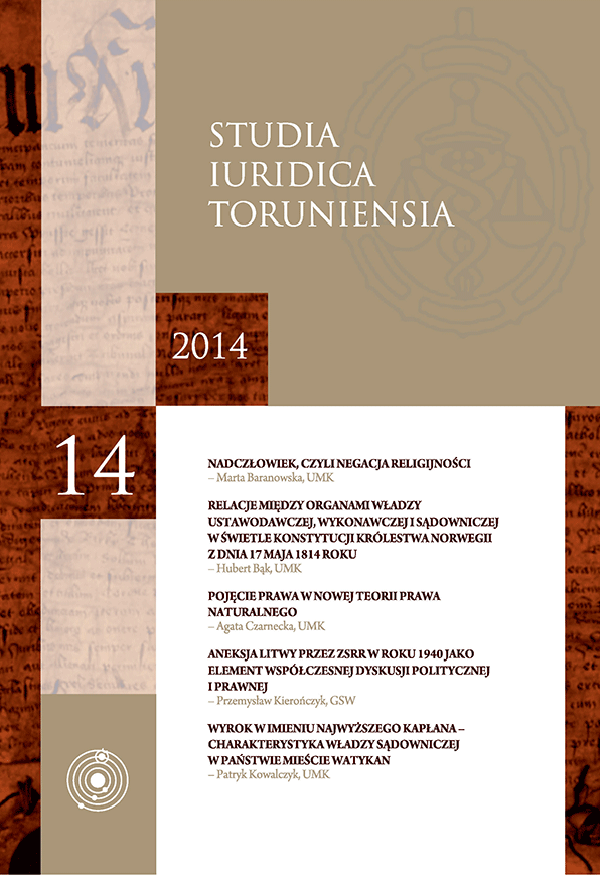The German Basic Lawand the jurisprudence of the Federal Constitutional Courtagainst the European integration
DOI:
https://doi.org/10.12775/SIT.2014.011Keywords
The Federal Republic of Germany, the German Basic Law, the Federal Constitutional Court, European integration, Germany, the European Union, the principles of EU law, the provisions of integration, integration legal norms, materieimmutablethe, SolangeAbstract
The Constitution of Germany as one of the few in Europe directly link to European integration and FKC law is treated in the European arena as one of the most objective, competent and reliable. His sentences have a huge impact not only between Germany and European Union, but also the Member States and European Union. Very often, scholars of constitutional law and European law refers to the jurisprudence of FKC, as some of his sentences are simply regarded as a priority and have a real compelling solutions from the point of view of constitutional law and European law issues. In my paper Irefer directly to the rules and integration clauses in Germany’s constitution and focus on their interpretation and select the important from the point of view of the implementation of EU law unchangeable Materials contained in the Constitution, which very often are considered to be some brake on integration. Referring to the present case FKC position to protect human and civil rights in the EU and its role in this area, as well as conflicts arising from the ratification of the Maastricht Treaty and the Treaty of Lisbon. At the beginning of a shift the origins of the Basic Law itself, as the story of its creation and the form has a huge impact on its content and not the status of the law, but in the minds of German citizens.
References
Arnold R., Orzecznictwo Federalnego Trybunału Konstytucyjnego, a proces integracji europejskiej, „Studia Europejskie” 1999, nr 1.
Banaszak B., Malicka A., Konstytucja Niemiec, Warszawa 2008.
Brauer R., Die Sackgasee des neuen Europaartikels (art. 33 GG), „Neue Zeitschrift fur Verwalungsgericht” 1994, Nr. 5.
Chmaj M., Sokół W., Mała encyklopedia wiedzy politycznej, Toruń 2004.
Dreier H., Grundgesetz. Kommentar. 2 Auflage, Mohr Siebeck 2006.
Janicka D., Ustawa zasadnicza w praktyce Republiki Federalnej Niemiec (1949–1989), Toruń 2009.
Justyńska P., Zasady prawa Unii Europejskiej, w: Podstawy prawa Unii Europejskiej. Zarys wykładu, red. J. Galster, Toruń 2006.
Kustra A., Przepisy i normy integracyjne w wybranych państw członkowskich UE, Toruń 2006.
Witkowski S., Materie niezmienialne w Ustawie zasadniczej RFN (art. 79 ust. 3) a integracja europejska, „Zagadnienia Sądownictwa Konstytucyjnego” 2011, nr 2 (2).
Witkowski S., Zmiany ustawy zasadniczej w świetle członkostwa Niemiec w UE, w: Europeizacja konstytucji państw Unii Europejskiej, red. K. Kubuj, J. Wawrzyniak, Warszawa 2011.
Wojtyczek K., Zasada otwartej państwowości w Ustawie zasadniczej RFN, „Przegląd Sejmowy” 2009, nr 6 (95).
Wojtowicz K., Otwarcie systemu konstytucyjnego Niemiec na sprawy jedności Europy, „Przegląd Sejmowy” 2009, nr 6 (95).
Wojtowicz K., Prawo Wspólnot Europejskich a zasada suwerenności w prawie konstytucyjnym państw członkowskich, w: Wspólnoty Europejskie – wybrane problemy prawne, cz. 1, red. J. Kolasa, Wrocław 1998.
Downloads
Published
How to Cite
Issue
Section
Stats
Number of views and downloads: 2223
Number of citations: 0



